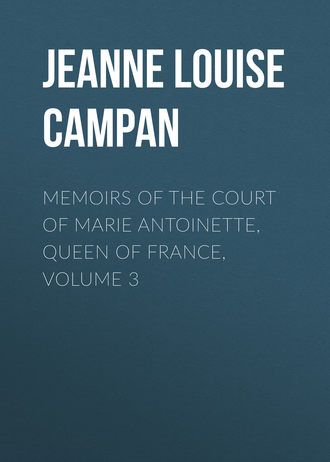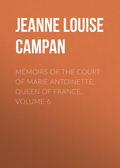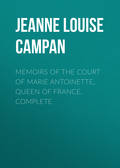
Jeanne Louise Henriette Campan
Memoirs of the Court of Marie Antoinette, Queen of France, Volume 3
After dinner, and before the hour for cards, the Queen, the Princesses, and their ladies, paraded among the clumps of trees, in little carriages, beneath canopies richly embroidered with gold, drawn by men in the King's livery. The trees planted by Louis XIV. were of prodigious height, which, however, was surpassed in several of the groups by fountains of the clearest water; while, among others, cascades over white marble, the waters of which, met by the sunbeams, looked like draperies of silver gauze, formed a contrast to the solemn darkness of the groves.
In the evening nothing more was necessary for any well-dressed man to procure admission to the Queen's card parties than to be named and presented, by some officer of the Court, to the gentleman usher of the card-room. This room, which was very, large, and of octagonal shape, rose to the top of the Italian roof, and terminated in a cupola furnished with balconies, in which ladies who had not been presented easily obtained leave to place themselves, and enjoy, the sight of the brilliant assemblage.
Though not of the number of persons belonging to the Court, gentlemen admitted into this salon might request one of the ladies seated with the Queen at lansquenet or faro to bet upon her cards with such gold or notes as they presented to her. Rich people and the gamblers of Paris did not miss one of the evenings at the Marly salon, and there were always considerable sums won and lost. Louis XVI. hated high play, and very often showed displeasure when the loss of large sums was mentioned. The fashion of wearing a black coat without being in mourning had not then been introduced, and the King gave a few of his 'coups de boutoir' to certain chevaliers de St. Louis, dressed in this manner, who came to venture two or three louis, in the hope that fortune would favour the handsome duchesses who deigned to place them on their cards.
[Bachaumont in his "Memoirs," (tome xii., p. 189), which are often satirical; and always somewhat questionable, speaks of the singular precautions taken at play at Court. "The bankers at the Queen's table," says he, "in order to prevent the mistakes [I soften the harshness of his expression] which daily happen, have obtained permission from her Majesty that before beginning to play the table shall be bordered by a ribbon entirely round it, and that no other money than that upon the cards beyond the ribbon shall be considered as staked."—NOTE By THE EDITOR.]
Singular contrasts are often seen amidst the grandeur of courts. In order to manage such high play at the Queen's faro table, it was necessary to have a banker provided with large, sums of money; and this necessity placed at the table, to which none but the highest titled persons were admitted in general, not only M. de Chalabre, who was its banker, but also a retired captain of foot, who officiated as his second. A word, trivial, but perfectly appropriate to express the manner in which the Court was attended there, was often heard. Gentlemen presented at Court, who had not been invited to stay at Marly, came there notwithstanding, as they did to Versailles, and returned again to Paris; under such circumstances, it was said such a one had been to Marly only 'en polisson';—[A contemptuous expression, meaning literally "as a scamp" or "rascal"]—and it appeared odd to hear a captivating marquis, in answer to the inquiry whether he was of the royal party at Marly, say, "No, I am only here 'en polisson'," meaning simply "I am here on the footing of all those whose nobility is of a later date than 1400." The Marly excursions were exceedingly expensive to the King. Besides the superior tables, those of the almoners, equerries, maitres d'hotel, etc., were all supplied with such a degree of magnificence as to allow of inviting strangers to them; and almost all the visitors from Paris were boarded at the expense of the Court.
The personal frugality of the unfortunate Prince who sank beneath the weight of the national debts thus favoured the Queen's predilection for her Petit Trianon; and for five or six years preceding the Revolution the Court very seldom visited Marly.
The King, always attentive to the comfort of his family, gave Mesdames, his aunts, the use of the Chateau de Bellevue, and afterwards purchased the Princesse de Guemenee's house, at the entrance to Paris, for Elisabeth. The Comtesse de Provence bought a small house at Montreuil; Monsieur already had Brunoy; the Comtesse d'Artois built Bagatelle; Versailles became, in the estimation of all the royal family, the least agreeable of residences. They only fancied themselves at home in the plainest houses, surrounded by English gardens, where they better enjoyed the beauties of nature. The taste for cascades and statues was entirely past.
The Queen occasionally remained a whole month at Petit Trianon, and had established there all the ways of life in a chateau. She entered the sitting-room without driving the ladies from their pianoforte or embroidery. The gentlemen continued their billiards or backgammon without suffering her presence to interrupt them. There was but little room in the small Chateau of Trianon. Madame Elisabeth accompanied the Queen there, but the ladies of honour and ladies of the palace had no establishment at Trianon. When invited by the Queen, they came from Versailles to dinner. The King and Princes came regularly to sup. A white gown, a gauze kerchief, and a straw hat were the uniform dress of the Princesses.
[The extreme simplicity of the Queen's toilet began to be strongly censured, at first among the courtiers, and afterwards throughout the kingdom; and through one of those inconsistencies more common in France than elsewhere, while the Queen was blamed, she was blindly imitated. There was not a woman but would have the same undress, the same cap, and the same feathers as she had been seen to wear. They crowded to Mademoiselle Bertin, her milliner; there was an absolute revolution in the dress of our ladies, which gave importance to that woman. Long trains, and all those fashions which confer a certain nobility on dress, were discarded; and at last a duchess could not be distinguished from an actress. The men caught the mania; the upper classes had long before given up to their lackeys feathers, tufts of ribbon, and laced hats. They now got rid of red heels and embroidery; and walked about our streets in plain cloth, short thick shoes, and with knotty cudgels in their hands. Many humiliating scrapes were the consequence of this metamorphosis. Bearing no mark to distinguish them from the common herd, some of the lowest classes got into quarrels with them, in which the nobles had not always the best of it.—MONTJOIE, "History of Marie Antoinette."]
Examining all the manufactories of the hamlet, seeing the cows milked, and fishing in the lake delighted the Queen; and every year she showed increased aversion to the pompous excursions to Marly.
The idea of acting comedies, as was then done in almost all country houses, followed on the Queen's wish to live at Trianon without ceremony.
[The Queen got through the characters she assumed indifferently enough; she could hardly be ignorant of this, as her performances evidently excited little pleasure. Indeed, one day while she was thus exhibiting, somebody ventured to say, by no means inaudibly, "well, this is royally ill played!" The lesson was thrown away upon her, for never did she sacrifice to the opinion of another that which she thought permissible. When she was told that her extreme plainness in dress, the nature of her amusements, and her dislike to that splendour which ought always to attend a Queen, had an appearance of levity, which was misinterpreted by a portion of the public, she replied with Madame de Maintenon: "I am upon the stage, and of course I shall be either hissed or applauded." Louis XIV. had a similar taste; he danced upon the stage; but he had shown by brilliant actions that he knew how to enforce respect; and besides, he unhesitatingly gave up the amusement from the moment he heard those beautiful lines in which Racine pointed out how very unworthy of him such pastimes were.—MONTJOIE, "History of Marie Antoinette."]
It was agreed that no young man except the Comte d'Artois should be admitted into the company of performers, and that the audience should consist only of the King, Monsieur, and the Princesses, who did not play; but in order to stimulate the actors a little, the first boxes were to be occupied by the readers, the Queen's ladies, their sisters and daughters, making altogether about forty persons.
The Queen laughed heartily at the voice of M. d'Adhemar, formerly a very fine one, but latterly become rather tremulous. His shepherd's dress in Colin, in the "Devin du Village," contrasted very ridiculously with his time of life, and the Queen said it would be difficult for malevolence itself to find anything to criticise in the choice of such a lover. The King was highly amused with these plays, and was present at every performance. Caillot, a celebrated actor, who had long quitted the stage, and Dazincourt, both of acknowledged good character, were selected to give lessons, the first in comic opera, of which the easier sorts were preferred, and the second in comedy. The office of hearer of rehearsals, prompter, and stage manager was given to my father-in-law. The Duc de Fronsac, first gentleman of the chamber, was much hurt at this. He thought himself called upon to make serious remonstrances upon the subject, and wrote to the Queen, who made him the following answer: "You cannot be first gentleman when we are the actors. Besides, I have already intimated to you my determination respecting Trianon. I hold no court there, I live like a private person, and M. Campan shall be always employed to execute orders relative to the private fetes I choose to give there." This not putting a stop to the Duke's remonstrances, the King was obliged to interfere. The Duke continued obstinate, and insisted that he was entitled to manage the private amusements as much as those which were public. It became absolutely necessary to end the argument in a positive manner.
The diminutive Duc de Fronsac never failed, when he came to pay his respects to the Queen at her toilet, to turn the conversation upon Trianon, in order to make some ironical remarks on my father-in-law, of whom, from the time of his appointment, he always spoke as "my colleague Campan." The Queen would shrug her shoulders, and say, when he was gone, "It is quite shocking to find so little a man in the son of the Marechal de Richelieu."
So long as no strangers were admitted to the performances they were but little censured; but the praise obtained by the performers made them look for a larger circle of admirers. The company, for a private company, was good enough, and the acting was applauded to the skies; nevertheless, as the audience withdrew, adverse criticisms were occasionally heard. The Queen permitted the officers of the Body Guards and the equerries of the King and Princes to be present at the plays. Private boxes were provided for some of the people belonging to the Court; a few more ladies were invited; and claims arose on all sides for the favour of admission. The Queen refused to admit the officers of the body guards of the Princes, the officers of the King's Cent Suisses, and many other persons, who were highly mortified at the refusal.
While delight at having given an heir to the throne of the Bourbons, and a succession of fetes and amusements, filled up the happy days of Marie Antoinette, the public was engrossed by the Anglo-American war. Two kings, or rather their ministers, planted and propagated the love of liberty in the new world; the King of England, by shutting his ears and his heart against the continued and respectful representations of subjects at a distance from their native land, who had become numerous, rich, and powerful, through the resources of the soil they had fertilised; and the King of France, by giving support to this people in rebellion against their ancient sovereign. Many young soldiers, belonging to the first families of the country, followed La Fayette's example, and forsook luxury, amusement, and love, to go and tender their aid to the revolted Americans. Beaumarchais, secretly seconded by Messieurs de Maurepas and de Vergennes, obtained permission to send out supplies of arms and clothing. Franklin appeared at Court in the dress of an American agriculturist. His unpowdered hair, his round hat, his brown cloth coat formed a contrast to the laced and embroidered coats and the powder and perfume of the courtiers of Versailles. This novelty turned the light heads of the Frenchwomen. Elegant entertainments were given to Doctor Franklin, who, to the reputation of a man of science, added the patriotic virtues which invested him with the character of an apostle of liberty. I was present at one of these entertainments, when the most beautiful woman out of three hundred was selected to place a crown of laurels upon the white head of the American philosopher, and two kisses upon his cheeks. Even in the palace of Versailles Franklin's medallion was sold under the King's eyes, in the exhibition of Sevres porcelain. The legend of this medallion was
"Eripuit coelo fulmen, sceptrumque tyrannis."
The King never declared his opinion upon an enthusiasm which his correct judgment no doubt led him to blame. The Queen spoke out more plainly about the part France was taking respecting the independence of the American colonies, and constantly opposed it. Far was she from foreseeing that a revolution at—such a distance could excite one in which a misguided populace would drag her from her palace to a death equally unjust and cruel. She only saw something ungenerous in the method which France adopted of checking the power of England.
However, as Queen of France, she enjoyed the sight of a whole people rendering homage to the prudence, courage, and good qualities of a young Frenchman; and she shared the enthusiasm inspired by the conduct and military success of the Marquis de La Fayette. The Queen granted him several audiences on his first return from America, and, until the 10th of August, on which day my house was plundered, I preserved some lines from Gaston and Bayard, in which the friends of M. de La Fayette saw the exact outline of his character, written by her own hand:
"Why talk of youth,
When all the ripe experience of the old
Dwells with him? In his schemes profound and cool,
He acts with wise precaution, and reserves
For time of action his impetuous fire.
To guard the camp, to scale the leaguered wall,
Or dare the hottest of the fight, are toils
That suit th' impetuous bearing of his youth;
Yet like the gray-hair'd veteran he can shun
The field of peril. Still before my eyes
I place his bright example, for I love
His lofty courage, and his prudent thought.
Gifted like him, a warrior has no age."
[During the American war a general officer in the service of the United States advanced with a score of men under the English batteries to reconnoitre their position. His aide-de-camp, struck by a ball, fell at his side. The officers and orderly dragoons fled precipitately. The general, though under the fire of the cannon, approached the wounded man to see whether any help could be afforded him. Finding the wound had been mortal, he slowly rejoined the group which had got out of the reach of the cannon. This instance of courage and humanity took place at the battle of Monmouth. General Clinton, who commanded the English troops, knew that the Marquis de La Fayette generally rode a white horse; it was upon a white horse that the general officer who retired so slowly was mounted; Clinton desired the gunners not to fire. This noble forbearance probably saved M. de La Fayette's life, for he it was. At that time he was but twenty-two years of age.—"Historical Anecdotes of the Reign of Louis XVI."]
These lines had been applauded and encored at the French theatre; everybody's head was turned. There was no class of persons that did not heartily approve of the support given openly by the French Government to the cause of American independence. The constitution planned for the new nation was digested at Paris, and while liberty, equality, and the rights of man were commented upon by the Condorcets, Baillys, Mirabeaus, etc., the minister Segur published the King's edict, which, by repealing that of 1st November, 1750, declared all officers not noble by four generations incapable of filling the rank of captain, and denied all military rank to the roturiers, excepting sons of the chevaliers de St. Louis.
["M. de Segur," says Chamfort, "having published an ordinance which prohibited the admission of any other than gentlemen into the artillery corps, and, on the other hand, none but well-educated persons being proper for admission, a curious scene took place: the Abbe Bossat, examiner of the pupils, gave certificates only to plebeians, while Cherin gave them only to gentlemen. Out of one hundred pupils, there were not above four or five who were qualified in both respects."]
The injustice and absurdity of this law was no doubt a secondary cause of the Revolution. To understand the despair and rage with which this law inspired the Tiers Etat one should have belonged to that honourable class. The provinces were full of roturier families, who for ages had lived as people of property upon their own domains, and paid the taxes. If these persons had several sons, they would place one in the King's service, one in the Church, another in the Order of Malta as a chevalier servant d'armes, and one in the magistracy; while the eldest preserved the paternal manor, and if he were situated in a country celebrated for wine, he would, besides selling his own produce, add a kind of commission trade in the wines of the canton. I have seen an individual of this justly respected class, who had been long employed in diplomatic business, and even honoured with the title of minister plenipotentiary, the son-in-law and nephew of colonels and town mayors, and, on his mother's side, nephew of a lieutenant-general with a cordon rouge, unable to introduce his sons as sous-lieutenants into a regiment of foot.
Another decision of the Court, which could not be announced by an edict, was that all ecclesiastical benefices, from the humblest priory up to the richest abbey, should in future be appanages of the nobility. Being the son of a village surgeon, the Abbe de Vermond, who had great influence in the disposition of benefices, was particularly struck with the justice of this decree.
During the absence of the Abbe in an excursion he made for his health, I prevailed on the Queen to write a postscript to the petition of a cure, one of my friends, who was soliciting a priory near his curacy, with the intention of retiring to it. I obtained it for him. On the Abbe's return he told me very harshly that I should act in a manner quite contrary to the King's wishes if I again obtained such a favour; that the wealth of the Church was for the future to be invariably devoted to the support of the poorer nobility; that it was the interest of the State that it should be so; and a plebeian priest, happy in a good curacy, had only to remain curate.
Can we be astonished at the part shortly afterwards taken by the deputies of the Third Estate, when called to the States General?






